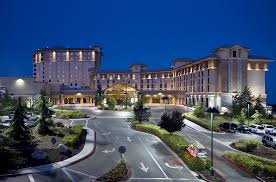

Chukchansi/Yokut baskets represent some of the finest work in California and can be seen both locally as well as in museums across the U.S.

The language is being preserved, as are the traditions of basket materials gathering and construction. While there are few fluent Chukchansi speakers, Chukchansi phrases are commonly heard among community members. Renewed interest in the traditions and history continues to increase. The resurgence of the Chukchansi people reflects their resilience and tenacity. It is estimated that over ninety percent of the Indian people disappeared in a fifty-year period between 1848-1900. Parents were encouraged/forced to send their children to boarding schools far from their homes, some never to return. The Chukchansi people were marginalized to small allotments and many of the young women were forced to marry outside of their Native communities.

Their land was stolen, diseases spread and natives were murdered. They fed themselves by hunting and fishing and by practicing incipient horticulture, carefully gathering, pruning, and burning the land to maximize food production.ĭuring the mid-to-late 19th century after the discovery of gold, life changed dramatically for the Chukchansi people. They lived in scattered villages, hamlets, and extended families. The Chukchansi were hunters and gatherers and would seasonally follow the food sources for hunting and gathering. The North Fork Mono people are located to the east of our Museum, and the Southern Sierra Miwok are located north of the Museum. The Chukchansi people have lived in this area for over 8,000 years, once occupying a much larger territory. Events At Chukchansi Park Tequila Fest - May 20 Taco Truck Throwdown presents Tequila Fest on May 20th at Chukchansi Park, with headliners T.I., Rick Ross, and Lil Jon. They are related in language to the Yokut speaking people of the Great San Joaquin Valley. The Chukchansi Indians are indigenous to this region.


 0 kommentar(er)
0 kommentar(er)
